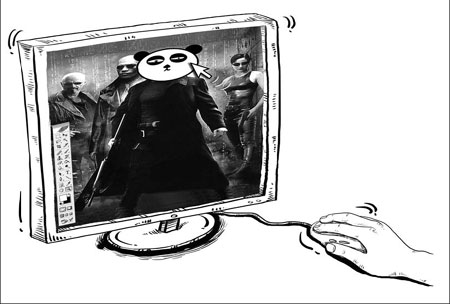West caught in the Net of double standard
Updated: 2011-12-07 08:00
By Andre Vltchek (China Daily)
|
|||||||||
|
Wang Xiaoying / China Daily |
Journalists and researchers have to follow strict rules before accusing Western governments, companies or individuals of any wrongdoing. Or else, draconic regulations will ensure they face defamation cases or public ridicule or both. It appears that only Western interests, or the interests of the West's allies, are well protected against groundless accusations. As for others, they can be accused of anything without the "support of sufficient evidence".
In his article, "US report accuses China and Russia of Internet spying", published in The New York Times (Nov 3, 2011), Tom Shanker argues: "American intelligence agencies, in an unusually blunt public criticism of China and Russia, reported to Congress that those two foreign governments steal valuable American technology over the Internet as a matter of national policy "
The article does not have even a single quote from a person supporting the report. In fact, it has only a few lines from the report itself. It does not give the name of the report, and provides neither a link to it nor any information on where could it be read.
One thing that is not missing in the article is confidence; it leaves no room for doubt. As always, anti-China propaganda does not need any proof in the mass media or any other field for that matter. It is manufactured at short intervals and with predictable regularity.
"I really don't understand how could anybody be sure that 'China is involved in Internet espionage'", said Naoko K, who was reluctant to give her surname because she works for a company in Tokyo that operates in the West and because she "doesn't want to get involved in any ideological debate".
"Some of the most skilled hackers are in Europe and the Unites States. Almost all of them are trying to cause damage to some country or company. It is very difficult to identify their location or nationality," she said.
It appears that propaganda often has the opposite effect, because many Chinese bloggers appear to be losing their patience with the West for constantly depicting their country as a villain.
I contacted Onno W. Purbo in Indonesia, the fourth most populous nation on earth and facing serious hacking problems of its own, to find out how easy it was to determine from where exactly did a hacker launch his/her attack. Purbo is the most influential developer of the Internet in Indonesia and a former professor of the prestigious Bandung Institute of Technology.
So how "bad" is China in cyberspace?
Purbo said: "In reality, there are hackers in all developed countries. Good hackers exist in Russia and China but (they are) also in the US, Europe and Australia."
"In cyberspace, it is difficult to get concrete evidence. We need really capable 'forensic' experts to collect concrete evidence, for which they have to check all computer logs. And this is what makes it difficult to trace (a hacker).
"It is not easy to identify that an attack came from China, because a computer in China with a security hole can be exploited by a hacker in Europe, Australia or the US who then enters a Western country that he does not like so that the attacked server will think the attack came from China. Of course, the hacker has gone through a compromised server in China but the source of the attack can be outside China."
"A (deft) hacker will often 'jump' through many servers or routers before reaching his/her final destination, that is, the one he/she wants to attack, so that the attacked server will not know where the attack came from. This is a standard mechanism of an attack."
So why do the Western media play up the Chinese Internet espionage story? "Hmmm, I don't know for sure. Maybe they are afraid of China's capabilities in cyberspace?" Purbo said.
Many people wonder why US officials do not approach institutions that could deal with hacking issues from strictly a technical point of view, instead of pointing the finger at and leveling unsubstantiated accusations against China.
Perhaps only Westerners who fabricate "China Internet espionage" stories can tell us why they don't get the problem solved through technical means rather than trying to tarnish China's cyber-image without even bothering to provide any supporting evidence.
The author is an American novelist, documentary filmmaker and investigative journalist.












